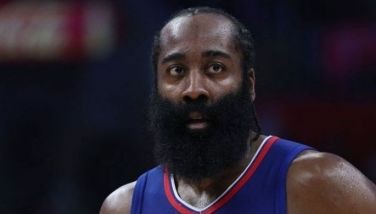Swimming needs new leadership
KUALA LUMPUR, Malaysia — The swimming team took a bow from the Southeast Asian Games, its association and swimmers unsure of their future in a sport run by an absentee president.
The swimmers finished with two silver medals and five bronzes from the 12-member team sent by PhilSwimming officer-in-charge, cum-secretary general Lani Velasco.
Of the 12, only three figured in the individual medal tally. Fil-American James Deiparine, based in the US, saved the Philippines from further embarrassment this year with his two silver medals — in the 50m and 100m breaststroke. Olympian Jasmine Alkhaldi had four bronze medals from the 100 and 200m freestyle and 50m butterfly and as a member of the 4x200m freestyle relay.
If this is the medal tally it will show in the 2019 Games, the association better not field a team or it should now consider as a priority a top-to-bottom reorganization upon arrival in Manila to avoid the ultimate insult of placing last in front of their fellow men.
The performance of the national swimming team took a sharp downturn during the last 10 years after its glory years in 2005 and it has since sunk to the bottom of the standings in the lowest regional competition, the Southeast Asian Games. It is quite sad for a sport that offers 46 gold medals and is a must sport in the SEA Games, Asian Games and Olympic Games.
This is the inevitable result of mismanagement of an association whose leadership has spent more time defending himself before the city courts and before the Ombudsman for misuse of funds.
Internally he is besieged by members seeking an accounting of membership funds from dues paid yearly by some one million members and 1,000 coaches . Mathematically, that is P10 million a year. That is on top of project fees for every sanctioned age group tournament and occasional subsidies from the International Swimming Federation (FINA) to the local association for swimming development.
Unable to force him to liquidate the association funds, his officials, Olympian and secretary general Ral Rosario and vice president Harry Roque resigned while the rest of the board, including former champion Akiko Thomson, chose to be inactive, giving him the full power to run the swimming association. He was left with one official, national coach Pinky Brosas, who also vacated his position when another coach, Archie Lim, took his place.
National athletes do not only feel the lack of concern of the association.
Years ago, the SEA Games Federation Council ruled that the silver medalist in men’s relay was stripped of the medal, making the Philippines the second placer. The members of the team inquired about the medals which the association failed to answer to their satisfaction. Today nobody knows where the silver medals are.
In 1998, right after winning the Asian Games silver medals in the breaststroke, Ryan Papa asked the association that he be accredited to represent the Philippines in the FINA World Championships.
For some unknown reason, the association denied the request. Papa at that time was ranked 13th in the world. Nobody, not even Eric Buhain (No. 187) and Miguel Molina (No, 190) came close to his ranking. Papa’s father sought the intervention of then President Fidel Ramos, who placed his handwritten note of endorsement on the side of the letter. In Malacañang parlance, that’s as good as approved. The association did not honor that. Months later, Papa announced his retirement from swimming.
Relations of swimming clubs with the swimming leadership have never been cordial. Fed up with his tactics, a swimming club led by his swimming contemporary dissociated herself from the then Philippine Amateur Swimming Association and formed the rival Philippine Swimming League. He branded the PSL and all clubs affiliated with it as bogus organizations and banned all its members and clubs from participation in the national championship and other qualifying tournaments for all international tournaments, senior or age group.
But the PSL has since gained ground with its regular monthly age group competitions including giving young swimmers a chance to compete in Taiwan, Malaysia, Thailand, Singapore, Hong Kong , Australia and even South Africa to give them foreign exposure at an early age.
The internal and outside pressures have not unsettled the current leadership who claims he is untouchable, being a (former) sec-gen of the POC, deputy secretary general of the Asian Amateur Swimming Federation and rules committee member of the International Swimming Federation FINA. So, the leadership crisis remains unsolved. The association seems to be working without some unseen hands behind its operations.
In charge in a temporary capacity of swimming affairs is Velasco, who was assigned to form the national team to Malaysia and attend to their needs here.
She formed the team, accompanied it to Malaysia and left the swimmers right after arriving in Kuala Lumpur to attend the World Junior Championships in Minneapolis. Left to care for the athletes are one foreign and one local coach. This reminds one of the 2013 SEA Games when Alkhaldi was forced to return the gold medal awarded her in the 100 meter freestyle because the officials saw a false start and ordered a re-swim. The Philippine camp protested but she later lost in the re-swim. That was the story of the gold that never was.
So it is no surprise that the Philippines finished last among six participating countries this year and the situation will continue to be so unless the organization itself is restructured to resolve many basic concerns which should now include basic directions for diving, water polo, synchronized swimming and open water swimming, which are all under the swimming association.
- Latest
- Trending





























